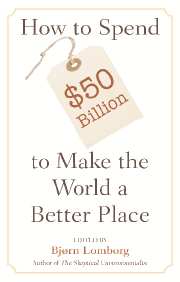Book contents
- Frontmatter
- Contents
- Contributors
- Introduction
- 1 Meeting the Challenge of Global Warming
- CLIMATE CHANGE – OPPONENTS' VIEWS
- 2 Communicable Diseases
- COMMUNICABLE DISEASES – OPPONENTS' VIEWS
- 3 The Challenge of Reducing the Global Incidence of Civil War
- THE CHALLENGE OF CONFLICTS – OPPONENTS' VIEWS
- 4 Toward a New Consensus for Addressing the Global Challenge of the Lack of Education
- THE CHALLENGE OF LACK OF EDUCATION – OPPONENTS' VIEWS
- 5 The Challenge of Poor Governance and Corruption
- THE CHALLENGE OF POOR GOVERNANCE AND CORRUPTION – OPPONENTS' VIEWS
- 6 Hunger and Malnutrition
- HUNGER AND MALNUTRITION – OPPONENTS' VIEWS
- 7 Population and Migration
- POPULATION: MIGRATION – OPPONENTS' VIEWS
- 8 The Water Challenge
- THE WATER CHALLENGE – OPPONENTS' VIEWS
- 9 Subsidies and Trade Barriers
- SUBSIDIES AND TRADE BARRIERS – OPPONENTS' VIEWS
- Expert Panel Ranking
- Index
Introduction
Published online by Cambridge University Press: 27 July 2009
- Frontmatter
- Contents
- Contributors
- Introduction
- 1 Meeting the Challenge of Global Warming
- CLIMATE CHANGE – OPPONENTS' VIEWS
- 2 Communicable Diseases
- COMMUNICABLE DISEASES – OPPONENTS' VIEWS
- 3 The Challenge of Reducing the Global Incidence of Civil War
- THE CHALLENGE OF CONFLICTS – OPPONENTS' VIEWS
- 4 Toward a New Consensus for Addressing the Global Challenge of the Lack of Education
- THE CHALLENGE OF LACK OF EDUCATION – OPPONENTS' VIEWS
- 5 The Challenge of Poor Governance and Corruption
- THE CHALLENGE OF POOR GOVERNANCE AND CORRUPTION – OPPONENTS' VIEWS
- 6 Hunger and Malnutrition
- HUNGER AND MALNUTRITION – OPPONENTS' VIEWS
- 7 Population and Migration
- POPULATION: MIGRATION – OPPONENTS' VIEWS
- 8 The Water Challenge
- THE WATER CHALLENGE – OPPONENTS' VIEWS
- 9 Subsidies and Trade Barriers
- SUBSIDIES AND TRADE BARRIERS – OPPONENTS' VIEWS
- Expert Panel Ranking
- Index
Summary
Each day decisions are made about global political priorities. We choose to support some worthy causes while others are disregarded. Unfortunately, political decisions seldom take into account a comprehensive view of the effects and costs of solving one problem in relation to another. Priorities are often set in an obfuscated environment involving the conflicting demands of the media, the people, and politicians. Despite all good intentions, the decision-making process is marred by arbitrary and haphazard methods. The idea behind the Copenhagen Consensus is to render, in the future, this process less arbitrary, because political decisions should not be made arbitrarily, but should be based on facts and knowledge. The result stemming from the Copenhagen Consensus 2004 is very concrete: a ranked list of real challenges, for real people, in the real world.
If we had an extra $50 billion to put to good use, which problems would we solve first? That was the question put to the participants of the Copenhagen Consensus. Using more than 600 pages of scholarly papers as their point of departure, the participants engaged in an intense scholarly discussion that resulted in a set list of priorities regarding the world's most challenging problems.
This book constitutes a concrete contribution to the debate regarding global priorities – the question of how do we tackle the world's problems, such as where should we start, and what should be done.
- Type
- Chapter
- Information
- How to Spend $50 Billion to Make the World a Better Place , pp. xi - xxiiPublisher: Cambridge University PressPrint publication year: 2006

